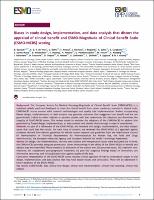| dc.contributor | Vall d'Hebron Barcelona Hospital Campus |
| dc.contributor.author | Gyawali, B. |
| dc.contributor.author | Dafni, U. |
| dc.contributor.author | Amaral, T. |
| dc.contributor.author | Barriuso, J. |
| dc.contributor.author | Bogaerts, J. |
| dc.contributor.author | Tabernero, Josep |
| dc.contributor.author | de Vries, Elisabeth |
| dc.date.accessioned | 2021-12-02T12:37:25Z |
| dc.date.available | 2021-12-02T12:37:25Z |
| dc.date.issued | 2021-06 |
| dc.identifier.citation | Gyawali B, de Vries EGE, Dafni U, Amaral T, Barriuso J, Bogaerts J, et al. Biases in study design, implementation, and data analysis that distort the appraisal of clinical benefit and ESMO-Magnitude of Clinical Benefit Scale (ESMO-MCBS) scoring. ESMO Open. 2021 Jun;6(3):100117. |
| dc.identifier.issn | 2059-7029 |
| dc.identifier.uri | https://hdl.handle.net/11351/6642 |
| dc.description | Diseño de ensayos clínicos; Implementación de ensayos clínicos; Informes de ensayos clínicos |
| dc.language.iso | eng |
| dc.publisher | BMJ |
| dc.relation.ispartofseries | ESMO Open;6(3) |
| dc.rights | Attribution-NonCommercial-NoDerivatives 4.0 International |
| dc.rights.uri | http://creativecommons.org/licenses/by-nc-nd/4.0/ |
| dc.source | Scientia |
| dc.subject | Càncer - Tractament |
| dc.subject | Assaigs clínics - Disseny |
| dc.subject.mesh | Neoplasms |
| dc.subject.mesh | /drug therapy |
| dc.subject.mesh | Research Design |
| dc.subject.mesh | Medical Oncology |
| dc.title | Biases in study design, implementation, and data analysis that distort the appraisal of clinical benefit and ESMO-Magnitude of Clinical Benefit Scale (ESMO-MCBS) scoring |
| dc.type | info:eu-repo/semantics/article |
| dc.identifier.doi | 10.1016/j.esmoop.2021.100117 |
| dc.subject.decs | neoplasias |
| dc.subject.decs | /farmacoterapia |
| dc.subject.decs | diseño de la investigación |
| dc.subject.decs | oncología médica |
| dc.relation.publishversion | https://doi.org/10.1016/j.esmoop.2021.100117 |
| dc.type.version | info:eu-repo/semantics/publishedVersion |
| dc.audience | Professionals |
| dc.contributor.organismes | Institut Català de la Salut |
| dc.contributor.authoraffiliation | [Gyawali B] Department of Oncology, Queen’s University, Kingston, Ontario, Canada. Department of Public Health Sciences, Queen’s University, Kingston, Ontario, Canada. Division of Cancer Care and Epidemiology, Queen’s University, Kingston, Ontario, Canada. [de Vries EGE] Department of Medical Oncology, University Medical Center Groningen, University of Groningen, Groningen, The Netherlands. [Dafni U] Laboratory of Biostatistics, School of Health Sciences, National and Kapodistrian University of Athens, Athens. Frontier Science Foundation-Hellas, Athens, Greece. [Amaral T] Skin Cancer Center, Department of Dermatology, Eberhard Karls University, Tuebingen, Germany. [Barriuso J] The Christie NHS Foundation Trust and Division of Cancer Sciences, School of Medical Sciences, Faculty of Biology, Medicine and Health, University of Manchester, Manchester, UK. [Bogaerts J] European Organisation for Research and Treatment of Cancer, Brussels, Belgium. [Tabernero J] Vall d'Hebron Hospital Universitari, Barcelona, Spain. Vall d’Hebron Institute of Oncology (VHIO), Barcelona, Spain. UVic-UCC, IO-Quiron, Barcelona, Spain |
| dc.identifier.pmid | 33887690 |
| dc.identifier.wos | 000663044500017 |
| dc.rights.accessrights | info:eu-repo/semantics/openAccess |

 Área privada
Área privada Contacto
Contacto







